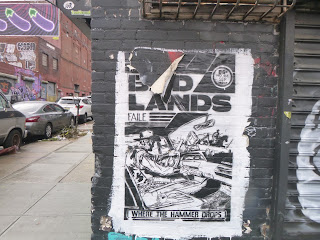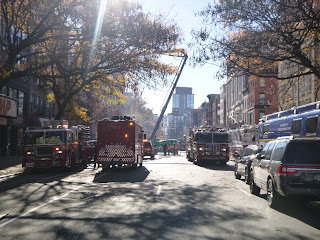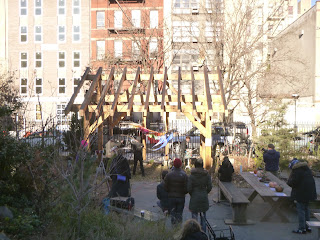Images of cities and lives, downtown Brooklyn, closing and opening.
I woke up Saturday feeling a strange lift, the Trump sadness less gripping.
I am sick of feeling it.
Its not as that the problems of the world are receding.
The city is crumbling, virus raging, beloved restaurants closing, businesses shuttering, CUNY contracting, and Middle Collegiate Church burning on 7th Street and 2nd Ave.
We served meals to homeless queer kids there, fights on Sundays if meals didn't come out on time.
Our Sentimental Educations come in countless forms, some more sentimental than others.
The last four years have been full of them.
For our reading group, they are about the novel by Gustave Flaubert.
For others, the education is about emotional growth, the line between love and community, eros and revolution, social change ebbing forward and back, anarchist collectives conspiring in Santa Cruz, harm reductionists making zines, old Beats reading poems on the beach, and flaneurs strolling through Paris.
We try not to become the things we fought in the first place.
Yet its not easy to avoid.
Ask anyone who promised not to date anyone like their parents.
Behind most every revolution is a guillotine and a jail cell.
Hannah Senesh never found her way out of a jail cell during World War II.
"I could have been twenty-three next July;
I gambled on what mattered most,
The dice were cast. I lost..."
She knew there was something else out there, even if she never made her way out to that endless summer. There beauty still remained:
"My God, My God, I pray that these things never end,
The sand and the sea,
The rustle of the waters,
Lightning of the Heavens,
The prayer of Man"
Sometimes we see it?
What is the line between love and politics, lives changing, kids growing, making their own mistakes?
What is the universal narrative - war and peace - inside of us, and out there, each of us separating and connecting and separating anew, before finding each other together?
Friday, the teenager and I drove to Long Island City, meandering from Brooklyn to Queens, through the morning rush, the city in locomotion, whistling out the door to her gig.
And the day opened up for us all, meals and friends and writing and planning and conspiring.
There's a feeling that something else is out there, a thawing of the nerves after a jittery four years, of kids in cages, climate nihilism, and fascism on the rise.
Sure this could all fall apart.
But possibly not.
There is something about a December rain.
Paul sent me an invitation for "a free, outdoor, socially distanced concert in La Plaza Cultural Community Garden at East 9th St & Avenue C in the East Village at 2pm on Saturday, December 5.
All afternoon, we walked through the rain into the city, the bright skies opening, talking about high school and the city, the pandemic, the things we've lost and gained, the punk memoirs she's reading, the places she skating.
We all come to knowing in our own ways, in our own histories.
Yadira Lopez describes the moment when she started reading the novel:
"I had begun ... during a recent trip to Santa Cruz, wherein I was paying a visit with romantic inclinations foremost in mind, secondly, a chance to see what the different milieus were presently interested with. I spent much of my time in this small city with anarchists who were marginally students, or had recently been students, most of whom could be divided into three camps; the primitivists, the anarcha-feminists, and the communist boys, all of whom I found lovely (even if I thought the divide was slightly unwarranted; for myself, as for a few others, the critique of technology and the abolition of the family and patriarchy are defining foundations of the communist critique)."
Thinking of San Francisco and decades of movements whirling through time, I began reading Flaubert's novel in November.
A few simple questions lead me through it:
Why do some stories grasp us?
What makes a book great?
I adore the protagonist, Frederic, walking the city, dreaming of Marie, his Beatrice.
What is Friedrich's passion, his love in life?
What happened in 1848?
Is it about failure?
What is the relationship between love and politics?
None of us really quite know.
I thought about this all weekend, walking to the waterfront with Caroline on Saturday,
out to Williamsburg with the teenager, looking at skates at Five Strides.
Grabbing some hummus, we talked about roller skating and crash pad down the street, closed after COVID.
Out to New Apostle Gallery 143 Berry Street gallery to see Haley Hughes' new works, inspired by the movements of our lives.
"I can't escape the feeling of us falling in love," declares graffiti on the street.
"She only felt alive when she was in love or in pain..."
"Evil is not inherent in nature, it is learned."
We wander over to Rough Trade, perusing the punk memoirs, thinking about the stories we'd like to read and write, the lines between our beloved Sally Bowles, her Weimar adventures, and our lives now:
South of the Park, Billy and Savitri walk me through the afternoon light, talking about what we can do now, what stories still matter, the poems, and demos, actions that no longer resonate, plays that will not be performed until next year or the following, the gossip about whose doing what, whose thinking, doing wondering, growing up, burning into the sky, kids and their parents, stories about Rome and Naples and Brooklyn, in between here and there.
In Bed Stuy, Erik and I catch up before I dash for dinner.
Our Sentimental Educations take place in countless forms, walking and reconciling, out to Fort Greene to pick up cards to send to Georgia, making our way from Brooklyn to the East Village.
Its still smoldering on 7th street and 2nd Ave.
The sign is down outside a restaurant where we used to hear jazz on St Marks Place.
A casualty of the pandemic, it could not adapt to outside dining.
EV Grieve reports:
The end of an era.
Pho soup is a welcome substitute, down the street.
We talk about getting back to Viet Nam.
The kids are selling their wares in the park,
The ballad of "Ballad of Cyclic Change" takes place at La Plaza, perfect light on Sunday, in the December cold, composting and art and regeneration the narratives of the day.
"Ballad of Cyclic Change" is a multimedia, collaborative art project with interactive sculptures ... Inspired by the biogeochemical cycles and how they mirror cycles in human lives, we built acoustic kinetic sculptures from upcycled everyday materials and created musical compositions using the sculptures as instruments. By connecting human stories of transition to nature’s cycles we encourage people to feel connected to their planet. Come get inspired to share a story from your life of change or transition."
Wendy and Ray and Paul and Christine together chatting, members of my old collectives, taking in the crisp day, listening, feeling.
The sadness of the day is fading as we stumble into something new, chatting about the book.
Frederick adored Marie, saw her in all the lonely places, the customers, the shadows enveloping him, the love for sale in Paris.
Love takes place in countless forms, conflicts, walking to the abyss, and coming right back.
Revolutions and backlash, our collectives come together and fall apart.
What makes a great book?
Its a story we all see ourselves in, our revolutions, failures and collective dreams.
Each of us has one, awakening and fading.
Our collective hopes, through the years and years of it, between then and now, into what will be, pausing for an upward feeling.
What makes a good story - shared dreaming - says Joan E.
Like Victor Hugo, its a grand history.
The flora in room, the details, the art on the walls tell us something.
Fred, he's gonna be famous.
Reading through his story, we wonder what it means to be in love.
Does he care about Marie or his projections, his adorations, his idea of beauty?
He sees her in everyone on the street, the ladies on the corners at Rue St Dennis.
In a lot of ways, this is autobiography, a story of the joy of obsessing.
He dreams about the theater, the players, their gossip, the ups downs, in between revolutions and his beloved Marie. I feel the same way.
I don't know about your reality.
Gustave Flaubert tells us about Frederic:
"After dinner he went slowly home through the streets. The lamps swung to and fro, casting long pitches of flickering yellowish light on to the mud. Shadows with umbrellas stole along the kerb. The pavement was slimy, a mist was falling, and he felt as if a moist darkness enveloping him, was sinking endlessly into his heart."
All day it rained in Brooklyn, before the skies cleared.
Images from the Ballad of Cyclical change.


























































































































































No comments:
Post a Comment